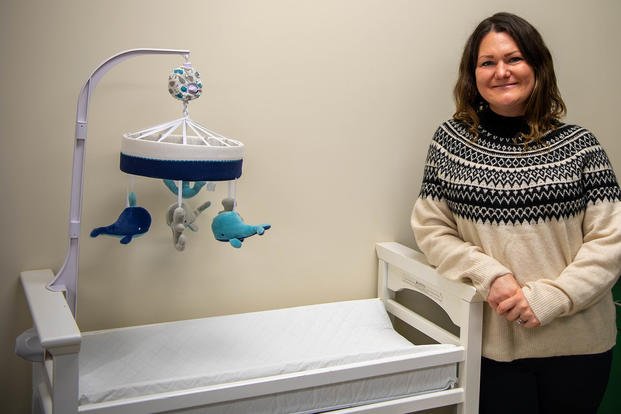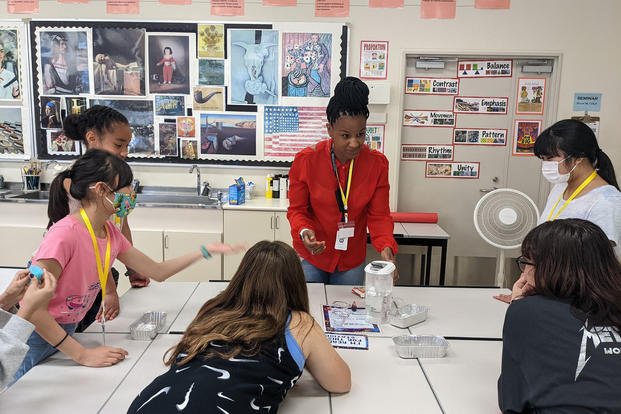During her 21 years as a military spouse, Sandy Thompson maintained her nursing career despite the regular march of permanent changes of station both in the U.S. and overseas.
When those moves came to an end, Thompson found herself in a state of transition in Norfolk, Virginia. She was divorcing and needed a job. A lead came from a friend who clipped out a newspaper advertisement for a visiting nurse position with the Navy-Marine Corps Relief Society (NMCRS). Thompson was hired.
That was 14 years ago, but at the time -- despite her former husband serving in the Navy -- Thompson had never heard of the society, let alone its Visiting Nurse Program.
"Is that amazing?" Thompson, who was familiar with the military health care system having given birth to two sons in military hospitals, told Military.com. "How can that be the best-kept secret?"
The relief society currently has 23 nurses posted across 20 locations to assist active-duty and retired sailors and Marines and their families inside and outside the United States. More than 850 visiting nurses have been involved with the program since its inception; it celebrated its centennial anniversary in November 2022.
As part of the free program, visiting nurses:
- Provide health education and resource referrals.
- Do home and virtual assessments.
- Address concerns about pregnancy, breastfeeding and postpartum care; chronic disease; and health and wellness.
- Reinforce instructions given by other health care providers.
- Communicate with civilian and military social service agencies and community health facilities to streamline resources for military families.
- Coordinate 15 classes and five support groups, tailoring the offerings to the local military community's needs.
Visiting nurses are not allowed to perform emergency care or skilled nursing, Rosemary Perdue, director of nursing for NMCRS, told Military.com.
"They need to be a registered nurse," Perdue said. "That's very important. They need to submit their resume, and what we look for are compassionate, well-rounded, well-experienced, flexible nurses who are able to think quickly on their feet and have very good critical thinking skills.
"It's very helpful if they understand the unique challenges of the military."
NMCRS nurses conducted almost 15,000 visits in 2022, a nearly 20% increase over the previous year, according to data provided by the relief society.
T'Sheira Scott, a certified lactation counselor and the wife of a naval chief petty officer, is based in Yokosuka, Japan, but also supports Naval Air Facility Atsugi. Scott has been a nurse for more than a decade, and a visiting nurse since 2021.

She called her current position a "blessing."
"I just enjoy the fact that I get to bring my compassion and love for nursing into my local community and help them in whatever way I possibly can," Scott told Military.com. "[This job] got me back to the foundation of nursing, just being able to care, being a Florence Nightingale."
Thompson has been a nurse since the mid-1980s. Nearly four decades of experience have taught her much about the nurse-patient dynamic, not least of which is that no concern is too small and answers can be readily available if you ask the right person.
Visiting nurses strive to be those people, because as Thompson said, "There's a lot of Dr. Google out there."
"I'm getting a lot of word-of-mouth phone calls," Thompson said. "'Hey, I heard how you did this home visit. Could you come to my house?' 'Well, yes, I can. I'd be happy to.'"
Visiting nurses can be part time, like Scott, or full time, like Thompson. Openings are posted on the relief society's website, and questions -- whether from prospective nurses or patients -- can be sent to visitingnurses@nmcrs.org.
Just don't expect to fill Thompson's position in the near future.
"I just love being kind and helpful when it really matters the most to that person," Thompson said. "It's the best job I've ever had. ... I will give it up when I am ready to retire, but otherwise no. I'm happy to be here."
-- Stephen Ruiz can be reached at stephen.ruiz@military.com.
Want to Know More About the Military?
Be sure to get the latest news about the U.S. military, as well as critical info about how to join and all the benefits of service. Subscribe to Military.com and receive customized updates delivered straight to your inbox.












